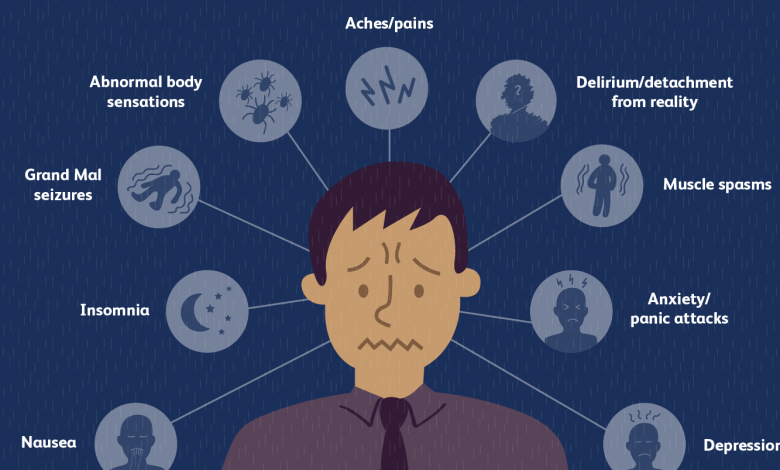Benzo Withdrawal: What To Expect And How To Cope With The Symptoms

Benzo withdrawal occurs when a person suddenly stops taking these drugs, which is not a good idea especially if the person has been using benzos for a long time, or in high dosages.
The first symptoms of withdrawal usually appear within 24 hours, and can sometimes last a few months. Here is a short guide on the typical withdrawal symptoms and how to cope with them.
Typical Benzo Withdrawal Symptoms
Around a day after not taking benzos, people can usually experience:
- A return of the symptoms that benzos were initially treating
- Irritation
- Poor concentration
- Insomnia
- Anxiety
These are followed by acute withdrawal symptoms, which generally appear within a few days and can last up to a month, though some people can struggle with them for longer. This is often the most difficult part of benzo withdrawal as people can experience a heightened severity of their symptoms.
These can include:
- Muscle spasms
- Aches and pains
- Weight loss
- Loss of appetite
- Concentration issues
- Depression
How to Cope with Benzo Withdrawal Symptoms
Benzo withdrawal can be dangerous and make the person go through excruciating pains, which is why most experts don’t recommend quitting cold turkey. Instead, it’s better to go through a supervised detox in a rehab facility, where the person can be monitored at all times.
In most cases, people addicted to benzos will go through both medical detox and addiction therapy to get better.
Medical detox means taking specific medication to help the patient go through the withdrawal process, and tapering off the addiction substance while under close supervision. The specific medications prescribed generally depend on the condition of the patient and how they are experiencing withdrawal, as this can greatly vary from person to person.
As for addiction therapy, this can include counseling or various cognitive-behavioral therapies. The goal is to help the person not just get the benzo out of their system safely, but help them build a strong bridge towards long-term sobriety. The therapies are designed to help the person build coping mechanisms which they can rely on for the rest of their life, and hopefully prevent a relapse in the future.
Getting Help Is Often the Hardest Part of Addiction
Benzo addiction is a terribly difficult thing to overcome, which is why people going through this cannot kick this habit on their own. In fact, benzo withdrawal symptoms can sometimes be life-threatening, which is why it’s very important to go through this process with the help of rehabs in cape town.
But, removing the substance from the person’s body is just one of the rehab components. It’s also vital to go through specialized therapy that can specifically treat addiction and help the person build their own path to sobriety. The journey is not easy, but with the right support, both from professionals and their loved ones, people can successfully recover from benzo addiction.
Please call rehabilitation centres durban for more information on our service offerings.
Benzo withdrawal occurs when a person suddenly stops taking these drugs, which is not a good idea especially if the person has been using benzos for a long time, or in high dosages.
The first symptoms of withdrawal usually appear within 24 hours, and can sometimes last a few months. Here is a short guide on the typical withdrawal symptoms and how to cope with them.
Typical Benzo Withdrawal Symptoms
Around a day after not taking benzos, people can usually experience:
- A return of the symptoms that benzos were initially treating
- Irritation
- Poor concentration
- Insomnia
- Anxiety
These are followed by acute withdrawal symptoms, which generally appear within a few days and can last up to a month, though some people can struggle with them for longer. This is often the most difficult part of benzo withdrawal as people can experience a heightened severity of their symptoms.
These can include:
- Muscle spasms
- Aches and pains
- Weight loss
- Loss of appetite
- Concentration issues
- Depression
How to Cope with Benzo Withdrawal Symptoms
Benzo withdrawal can be dangerous and make the person go through excruciating pains, which is why most experts don’t recommend quitting cold turkey. Instead, it’s better to go through a supervised detox in a rehab facility, where the person can be monitored at all times.
In most cases, people addicted to benzos will go through both medical detox and addiction therapy to get better.
Medical detox means taking specific medication to help the patient go through the withdrawal process, and tapering off the addiction substance while under close supervision. The specific medications prescribed generally depend on the condition of the patient and how they are experiencing withdrawal, as this can greatly vary from person to person.
As for addiction therapy, this can include counseling or various cognitive-behavioral therapies. The goal is to help the person not just get the benzo out of their system safely, but help them build a strong bridge towards long-term sobriety. The therapies are designed to help the person build coping mechanisms which they can rely on for the rest of their life, and hopefully prevent a relapse in the future.
Read more:6 Important Factors of Logistics That Helps Businesses in Dubai



